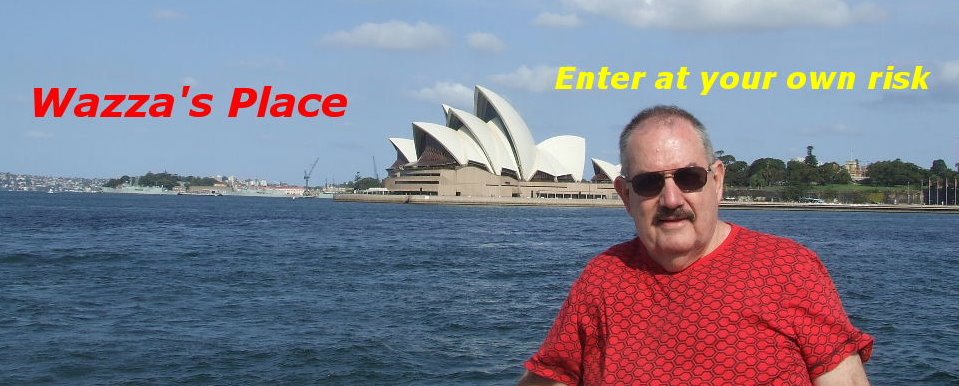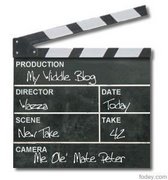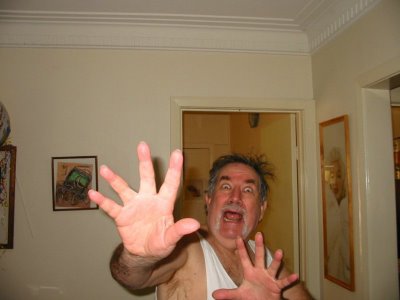Sir Charles Kingsford Smith, Australia’s Greatest Aviator
 ...........................Sir Charles Kingsford Smith.
...........................Sir Charles Kingsford Smith.
I was surfing on the T.V. recently when I came across a show
called “Air
minutes (I was already watching something else on another
channel). I switched on my DVD and recorded the rest of the
show. Weeks later I watched the show. This covered all of the
history of aviation in
current period. A lot of the third part was about Charles
Kingsford Smith. During my school days we had learnt about
“Smithy”, but there was a lot I did not know about his
record breaking flights.
From watching this show I was eager to learn more about
the exploits of this remarkable man, so I set about
researching his life. From what I discovered I thought I
should blog my findings.


Charles Edward Kingsford-Smith was born in the suburb of
was a bank manager in
Canadian Pacific Railways in
to
On 2 January 1907 young Charlie Smith was rescued from
certain drowning at Sydney’s famous Bondi Beach by bathers
who, just seven weeks later, were responsible for founding
the world’s first official surf lifesaving group at Bondi Beach
on 21 February 1907.
At the age of 13 he began studying mechanics and electrical
engineering at
Electrical Engineer at age 16. World War 1 burst over
and Charles enlisted on his 18th birthday. He enrolled in the
Australian Military Forces in 1915 firstly serving in the
East
The planes 'Smithy' learnt to fly were made of fabric, wire and
timber. It was something he loved from the very first moment.
He couldn't wait to see some action. After fighting at Gallipoli,
and a stint as a motor-bike despatch rider, he was chosen to
join
and then in 1917, in
the Military Cross for gallantry in action.
In one of his many flying missions during the war his plane
was riddled with bullets. 'Smithy' was shot in the foot and
later had three toes amputated. His war days were over.
He was presented with the Military Cross by King George
and at only 20 years old was a war hero. He travelled to
a dangerous occupation and when another stuntman was
killed he quit. On returning to
........Stunt flying in America.
The aviation industry in
founded the Western Australian Airways and provided the
first regular Australian airmail service between Geraldton
and
a round-Australia flight in 10 days 5 hours - which halved the
previous record. But what he really wanted was to be the first
to fly across the
donated money he went to the
prepare a Fokker Trimotor aircraft that he named the "Southern Cross".
................Smithy in front of The Southern Cross.
The "Southern Cross", or the "Old Bus" as it was affectionately
known, weighed 6840 kg. This included 4 crew at 291 kg,
3541 kg of benzine and 109 kg of oil. The aeroplane had a
wingspan of 23 metres; it was almost 15 metres long and
stood 3.9 metres high. It had a cruising speed of 150 kph.
On
navigator Harry Lyon and radio operator James Warner set
off from
marathon in a plane with an open cockpit. When they reached
the first air crossing of the Pacific. Three hundred thousand
people welcomed them when they flew to
This historic photo above shows the Fokker FVIIb-3m
NC1985 Southern Cross about to touch down in front of a
crowd of 20,000 at
time to cover the 7,388 miles (11,822 km) from
L-R: Harry Lyon, navigator, Charles T.P. Ulm, relief pilot, Capt. Charles Kingsford-Smith , pilot and James Warner, radio operator.
March 31st, 1929 Kingsford-Smith, Ulm, Litchfield and
McWilliams take off from Sydney to fly to England, and
disappeared whilst flying Southern Cross over the Kimberley.
They were saved this time, but only after a harrowing
10 days and close to starvation. The only provisions they
had were coffee and brandy. Search aircraft, the Kookaburra,
which had disappeared while searching the lost plane and
crew was later found with the bodies of Keith Anderson and
H. Hitchcock. The two men had died of thirst. They were
found by the aeroplane '
Refuelling after being forced down in the Kimberleys.
June 25th, 1929 Kingsford-Smith, Ulm, Litchfield and McWilliams
make the first flight from
12 days 18 hours.
................Charles Ulm and Smithy.
In 1930 at the age of 32 he flew 16,000 kilometres single
handedly and won the
after once again breaking the record for solo flight from
airman. 'Smithy' held more long distance flying records than
anyone else on earth.
 .....................Smithy at the controls of The Southern Cross.
.....................Smithy at the controls of The Southern Cross.
A Lockheed Altair 8D was shipped to Australia from the USA,
and rechristened Lady Southern Cross entry in the 1934
London-Melbourne MacRobertson Race but they did not race.
The plan had to be dropped when modifications to the aircraft
could not be completed in time, and it was then shipped to
Tommy Pethybridge set off for

They died in 1935 when his plane crashed into the sea off
the
to
the entire Rangoon-Singapore route, no trace of the Altair
was found for 18 months. In May 1937 its starboard
undercarriage leg was picked up by Burmese fishermen on
the rocky shore of Aye Island off the south coast of Burma
about 140 miles south-east of Rangoon. The theory grew
that Smithy had flown into the 460-foot top of the jungle
covered island and the aircraft had plunged into the sea,
the wheel breaking off and floating ashore. But an Australian
expedition to the island in 1983 searched the seabed without
success. The remains of the crew have never been located.
Charles Ulm died in 1934 when his plane crashed in the Pacific
while attempting to retrace his 1928 flight from
Charles Kingsford-Smith was knighted in 1932 for his
services to aviation in the Commonwealth of
Sir Charles Kingsford Smith has been honoured by his picture
on at least five stamps and is shown on the 20 dollar note.


Conscious that the Southern Cross had become an icon
and a national treasure, Smithy was able to negotiate,
with difficulty, a sale of the aircraft to the Australian
Government for £3,000. On
flew his faithful 'Old Bus' for the last time from its base at
for storage. The Southern Cross was kept in storage until
restored to flying condition during the Second World War to
feature in a film about the life of Smithy. Placed back in
storage, its future was uncertain. Plans were laid to house
it in a purpose-built building at
When
Southern Cross was re-housed in a new building on
Drive
 The Southern Cross in the purpose-built building.
The Southern Cross in the purpose-built building.
Most of the pictures are taken from old archived shots stored at
Picture
All pictures can be enlarged by clicking on each photo.
Some records broken by Sir Charles Kingsford Smith.
1930 Kingsford-Smith, Evert van Dijk, Paddy Saul and John
S.W. Stannage in "Southern Cross" make first successful
east-west crossing of
From
Kingsford-Smith lands at Oakland Airport,
the first pilot to circumnavigate the globe. The "Southern Cross"
took off from
Flying solo in the 'Southern Cross Junior', a small Avro Avian,
Kingsford-Smith breaks the
10,070 miles from
1931 Kingsford-Smith is rescued making the first England-Australia
airmail from Koepang in April, and in May takes the first
Australia-England air-mail to Akyab. Kingsford-Smith flies the
"Southern Star" from
first Christmas air-mail.
1933 October 4th. Kingsford-Smith breaks the solo England
to Australia record flying a Percival Gull monoplane,
"Miss Southern Cross", 10,070 miles from
in 7 days 4 hours 44 minutes.
Looking at the type of planes ‘Smithy’ and crew flew and the
amount of miles flown, it is a remarkable achievement what
was accomplished. Aviation as we know it today would not of
been possible except by the daring, bravery and raw “guts” of
flyers like Charles Kingsford Smith, Bert Hinkler (another
Australian pilot), Amelia Earhart, Charles Lindbergh and many others.















7 comments:
Wow you really "flew"into that post Wazza its only a couple of weeks since you told me you planned to do it. good post.
That's a great post, Warren. He's certainly an interesting character and what a lot he's done for aviation in Australia. We learnt a bit about "Smithy" at school, too, but you've given lots more information on the man.
That was a good programme, "Air Australia"...it covered a lot of ground (no pun intended). "Smithy" certainly was a colourful character.
Great, interesting post, Warren. I always enjoy the interesting stuff you and Peter post on your blogs.
Thanks for signing my Guest Book, Warren.
Hope your weekend is going well.
Take care, MEow
Hi Warren, that was great. His exploits reminded me of those of Amelia Earhart. She has fascinated me although I haven't written about her. I had thought of writing a historical fiction concerning her.
..
Hi Warren ~~ Great post about Smithy. You do a lot of research to post about the people and places you share with us. What is next on the list?
Thanks for the jokes you sent me, they will get posted.
Take care, my friend, All the best, Merle.
Wazza - 86 hours to Brisbane from Oakland? Wow... and I thought our flight from LAX to Sydney on Qantas' 747 of 16 hours seemed long? ~ jb///
Post a Comment